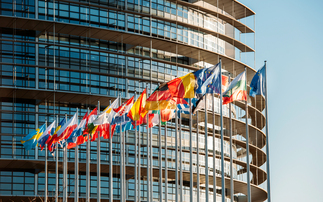Businesses already have much to celebrate at the Paris Summit, but the final push for a compromise agreement could turn a good deal into a great one
The Paris Summit is approaching crunch time, the final straight, the end game. Leaving aside the fact the only thing more prevalent here than confusing acronyms and bleary-eyed diplomats are the clichéd metaphors it is clear some form of agreement is now within grasp. Moreover, there is considerable optimism that a relatively ambitious deal can be reached over the next 48 hours or so as negotiators strive for a compromise position - or "point of equilibrium" in the evocative words of the hugely impressive French President Laurent Fabius.
The crucial sticking points relating to differences between rich and poor nations, climate finance, and the overall ambition of the proposed agreement remain. But ahead of the release of the latest text there are reports of positive bilaterals between the US and crucial players from India and Saudi Arabia, capital cities have been working the phones to try and deliver on the early positive rhetoric, and Brazil's environment ministry has suggested a political agreement "has been achieved".
For the many business observers on the sidelines of this summit, the optimism is even more profound.
The INDCs which provide the foundations of any agreement remain, in the words of one well-placed diplomat, "an unprecedented development, taking in 185 countries and covering 95 per cent of global emissions". They are backed right across the spectrum from the "high ambition coalition" to the emerging superpowers that stand accused of trying to engineer a watered down deal. National climate action plans and the massive clean tech markets and trillions of dollars of investment they will mobilise are here to stay.
Importantly these national plans look set to backed by significant agreements on climate finance, forest protection, and technology transfer, as well as tacit support for carbon markets, all of which will help create further markets and investment opportunities for green businesses. These markets have received boosts from the sidelines, as business leader, regional governments and cities have lined up to announce more multi-billion dollar clean tech commitments than it is possible to mention.
The sticking points centre on a collection of political issues, fuelled by the labyrinthine network of historic responsibility, post-imperialist grievance, personal grudge, and real politik power games that make the UN climate change negotiations so frustrating and enthralling. Green businesses will be disappointed aviation and shipping appears to have been pushed out of the deal and confined to the glacial process of delivering a mechanism for tackling emissions through the IMO and ICAO. But much of what progressive businesses need from an agreement has already been delivered through the system of INDCs and the growing number of countries backing ambitious action. In some important respects, the business community could pack up and head off to celebrate a successful summit before the sleep deprivation-induced hysteria kicks in.
And yet, no one is going home. The final few rounds of negotiations could yet determine whether Paris delivers a good deal for green business or a very good deal. Much remains on a knife edge, and not just because some of the encouraging progress delivered so far could be torpedoed by the guiding principle that "nothing is agreed until everything is agreed".
Several of the barriers to agreement might be political in their nature, but they have major implications for businesses.
First up the continuing stand-off over the overall level of ambition of an agreement with some nations backing a reference to 1.5C and post-2050 decarbonisation targets and others reluctant to include a 1.5C or any long term goal without a clearer sense of how it will be met will determine the degree of long term investor certainty businesses receive. A headline target may be easy to dismiss as an aspiration that will never be delivered in the lifetime of today's political and business leaders, but as an investment signal it has real value, hence the large number of multinational firms calling for a net zero emission goal. An ambitious goal will make it easier for both developed and developing nations to decarbonise, even if it makes some emerging economies understandably nervous about the implications for a global carbon budget that is fast running out.
The arcane row over differentiation with all its historical resonances and seemingly implacable positions similarly has implications for green businesses, particularly in emerging markets. A new system of differentiation - as demanded by many industrialised nations, including the UK and US - could unlock more cash for climate finance from some of the world's richest countries, while reform of the outdated dividing lines between annex one and non-annex one countries further increases the likelihood emerging economies will build on their already substantial low carbon infrastructure plans over time. Again, there are reasonable concerns such reforms could be used as a cover for industrialised nations to offload some of their historic responsibilities, but for most global businesses an agreement that acknowledges the shifting balance of geopolitical power would be better than one that tries to cement old dividing lines.
Finally, and most importantly, reports are emerging this morning of a simmering row over the proposed system for reviewing national progress against their INDCs every five years - it is an argument that desperately needs resolving.
As the UK's experience with its Climate Change Act and five year carbon budget mechanism demonstrates regular and co-ordinated reviews are critical to decarbonisation efforts. They help hold governments (and businesses) to account and make backsliding much harder (as the UK government is discovering with the avalanche of business criticism it has unleashed through its roll back of green policies). They are also crucial to a clean tech sector where technology costs and low carbon infrastructure thinking can be transformed inside two years, let alone five.
A global commitment to five year reviews, starting as soon as possible, would help the global green economy evolve and grow, making it far easier for governments to respond to developments in clean technology and green business models. Regular reviews increase the chances the global economy will use the current INDCs as foundations to build on, allowing us all to move from the current 2.7C to 3C pathway to something closer to the 1.5C to 2C goal.
The current objections to proposals for a system of reviews, which are being led by Malaysia and a number of other emerging economies, appear to centre on questions about national sovereignty and a reluctance to revisit in a few years INDCs that took so much work this time around. But issues of national pride need to be overcome when so much is at stake.
The system of reviews being proposed by the UK and EU would place no obligation on governments to upgrade their INDCs every five years, they would simply have to look at them and beef them up if they felt they had the capacity to do so. Countless businesses the world over, including in emerging economies, would welcome the signal provided by a five year cycle of reviews, which thanks to the rapid improvement of clean technologies would inevitably result in a cycle of constant improvement.
Green businesses already have plenty to celebrate in Paris. But the completion of a truly ambitious agreement would ensure this weekend marks an historic tipping point for the green economy, if that isn't one clichéd metaphor too many.
This article is part of BusinessGreen's Road to Paris hub, hosted in association with PwC.









